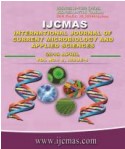


 National Academy of Agricultural Sciences (NAAS)
National Academy of Agricultural Sciences (NAAS)

|
PRINT ISSN : 2319-7692
Online ISSN : 2319-7706 Issues : 12 per year Publisher : Excellent Publishers Email : editorijcmas@gmail.com / submit@ijcmas.com Editor-in-chief: Dr.M.Prakash Index Copernicus ICV 2018: 95.39 NAAS RATING 2020: 5.38 |
Gastro intestinal helminthosis in horses are the serious health problem contributing to poor body condition, reduced work out, poor reproductive performance and short life span. Objective is to study the prevalence of gastrointestinal helminths of horses. A total of 247 faecal samples were collected from the horses. Faecal samples were brought to the laboratory for further processing and examined for the presence of parasitic infection by standard faecal sample examination method. A total of 247 faecal samples were collected from Anand district out of which 79 faecal samples were found positive with the overall prevalence of 31.98 %. Various gastrointestinal helminths have been encountered during the whole study period, viz. Strongylus spp. (11.74%), Parascaris equorum (8.91%), Oxyuris equi (2.83%), Strongyloides westeri (3.64%), Habronema spp. (0.81%), Amphistome spp. (1.21%), Anoplocephala spp. (0.40%) and Setaria equina (2.43%). There was statistically significant difference between monthwise and overall prevalence of different gastrointestinal helminthosis. However, there was no statistical difference in the season wise, agewise, sexwise and breedwise gastrointestinal helminthosis. Collection of fresh faecal samples for processing, if delay in faecal sample collection it will leads to hatching of eggs and contamination of faecal samples by another source. Gastrointestinal helminthosis is a common condition in horses.
 |
 |
 |
 |
 |